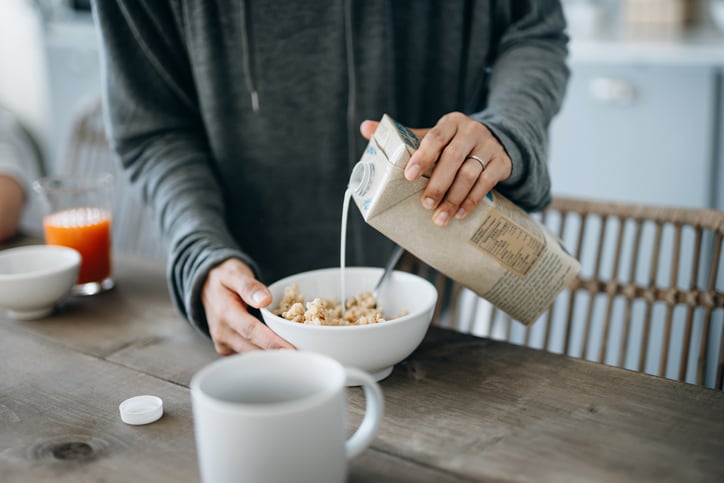Guidance formulated in February 2022 by the Food Standards and Information Focus Group (FSIFG) on behalf of Defra outlines that brands would be banned from using descriptors such as ‘yoghurt-style’ or ‘cheddar-type’, or homophones or misspellings such as ‘mylk’.
The guidance is based on the belief that consumers may be confused by names like ‘plant-based butter’ or ‘not milk’. The draft is currently awaiting publication and suggests that plant-based products should be prohibited from saying they are ‘not milk’ – or describing themselves as ‘alternatives’ to dairy products.
Up to now, trading standards officers have taken a light-touch approach to regulations on the use of dairy-derived names for plant-based foods. But the plant-based sector now fears the UK is intent on enforcing a stricter interpretation of rules. Food awareness group ProVeg UK has listed the names that would be forbidden from shelves under the new guidance, including Flora Plant B*tter, M.L.K.Ology, Wunda Plant Based Not Milk, Good Hemp – Oat + Hemp Milk, Mylk and Qurkee M’LK.
Dairy UK, a trade association in favour of the FSISG’s opinion, has stressed the guidance is an interpretation of existing law that has been in force for quite some time and does not propose to add new rules. “It is intended to make labelling and marketing clearer and minimise opportunities for consumers to be misled,” said chief executive Dr Judith Bryans. “The existing law is a reflection of the fact that dairy foods are unique in their nutrient richness and an essential part of a healthy and balanced diet and cannot be replaced by alternative imitations.”
But plant-based groups are concerned this kind of move would make the UK one of the most draconian nations in regard to what these sorts of products can and cannot be called. By contrast, the European Parliament chose in 2021 to drop Amendment 171 (a similar proposal to ban terms live ‘buttery’ and ‘creamy’ for purely plant-based products), while in the US, regulators recently issued guidance allowing plant-based drinks to use the word ‘milk’ determining consumers are not confused by terms such as ‘oat milk’.
Why is the dairy industry embroiling in a silly battle about the labelling of plant-based alternatives?
Plant-based groups expect more draft guidance FSISG in September, with the guidance likely to be published soon afterwards. Marisa Heath, CEO of the Plant Based Food Alliance UK, however, told FoodNavigator that because draft is interpretation of existing law “enforcement could be taken at any time. What really needs to happen is [for] Government to make a commitment to review the legislation at some point. Otherwise, we continue to exist under this cloud of being one of the most draconian countries there is on this issue.”
When asked when it expects the draft guidance to be enforced, Defra told FoodNavigator: “Responsibility for enforcing dairy labelling and marketing standards lies with local authorities and Trading Standards Officers.” Trading Standards Officers were, however, unable to comment.
Meanwhile, new campaigns have launched to stop Trading Standards from issuing guidelines preventing plant-based brands from using dairy-related terms such as ‘mylk’, ‘sheese’ and ‘b+tter’.
Palm PR, for example, has launched a petition to allow plant-based brands to continue to use dairy-related terms, which is supported by plant-based brands such as Cocos Organic, Nush Foods, Moving Mountains and One Planet Pizza. The Palm PR founders stated that Trading Standards should “keep the status quo and not undermine an exciting engine of growth, dynamism and innovation in the food and drink industry.” Vegan Society CEO Steve Hamon added: “There is no evidence that consumers are confused when buying plant-based dairy alternatives, and to argue that terms such as ‘not milk’ and ‘sheese’ are confusing and should be banned is ridiculous. This proposed measure… would actually limit consumer choice and work to suppress innovation in the green plant-based industry, where the UK should be a world leader.”
The Alternative Proteins Association (APA) has also called for ‘common-sense’ food labelling in a new the report which shows that removing familiar and widely used phrases from packaging would confuse consumers by making it harder for them to make informed choices at the checkout. British consumers are already protected by labelling rules that require detailed information on ingredients and nutrition, said APA President Jeremy Coller. “US regulators trust American consumers to know that oat milk doesn’t come from cows, so why do their UK counterparts assume British shoppers lack such common sense?” he asked. “The APA calls for common sense labelling that reflects 21st century language use and food choices, not more red tape that threatens to confuse consumers and strangle innovative British start-ups.”





